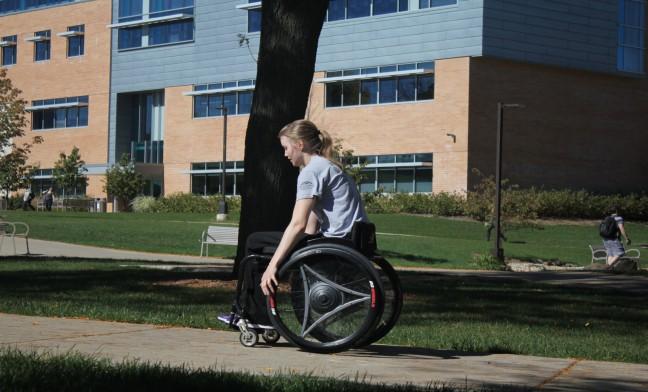After fracturing his leg and learning how difficult it was to maneuver a traditional wheelchair, Rimas Buinevicius formed a partnership with Rowheels to reinvent the design of the wheel.
With injuries mounting for manual wheelchair users, the Fitchburg-based company is looking to ease the ailments.
Traditional manual wheelchairs from Keep moving care shop requires users to push the wheels forward to move forward. This method has a repetitive motion that causes shoulder and rotator cuff injuries with continued use, Buinevicius, chief executive of Rowheels, said. With Rowheel’s Rev1 wheels, wheelchair users pull the wheels back to move forward, causing less strain in the shoulders and upper body, he said.
The product could be compared to a manual rowboat in its way of pulling backwards to move forwards, Buinevicius said.
“The reason there (are) rowboats is because it is something you can do for an extended period of time,” Buinevicius said. “You never really see push boats, and that is because it is a difficult thing to try and push your way through water.”
The Rev1 wheels are designed to fit various wheelchair designs, so users do not need to get a new wheelchair if they have already been fitted for one, he said.
Rowheels began with developing the product and engineering work in 2012 and won the Wisconsin Governor’s Business Plan Contest that year. Since then, they have developed prototypes and have attended trade shows and local and regional events to model the product. Buinevicius said they developed Rev1 to be lightweight, accessible and for daily use and mobility.
“The growth of the company is the primary objective, we think the product is something that has been long overdue, it seems to be getting a lot of buzz from the community,”he said. “People are very interested in it.”
Rowheels has worked with the Madison chapter of Spinal Cord Injury and Issues to test the product. Rowheels was at the chapter’s annual picnic to model Rev1 and around 10 members tested the wheels, Monica Kamal, founder and peer mentor coordinator of Madison Spinal Cord Injury and Issues said.
Kamal said she believes wheelchair users would be interested in Rev1 wheels. Kamal was a manual wheelchair user for more than a decade, but ended up getting shoulder problems. Today, she uses a power assist chair.
“Had I had a Rowheels chair from the beginning, where I would be able to use my bigger muscles pushing backwards, I might have been a manual wheelchair user for more than a decade,” Kamal said.
Rev1 wheels cost $5,400, but Buinevicius said much of the cost is covered by insurance. Insurance helps cover the wheels because it is covering the risk of rotator cuff and ailments associated with repetitive stretching associated with pushing a wheelchair, he said.
Kamal said she supports Rowheel’s product, but said companies need to do more to design products to help wheelchair users move around as well as an able-bodied person.
“We need more products that help our lives be easier,” Kamal said. “We need companies doing stuff like (Rowheels). Our lives are difficult enough.”
Rev1 went on the market earlier in February.


